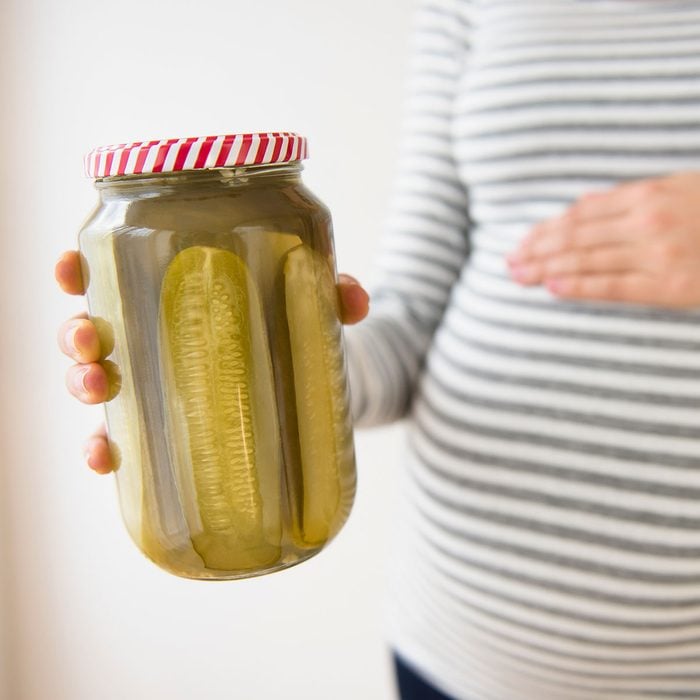Why Do Pregnant Women Crave Pickles?
Updated: Nov. 06, 2023

Why do pregnant women crave pickles and ice cream? Well, the science is mixed.
Pickles and ice cream anyone? Pregnancy is a time of rapid change, and you may be surprised at some of your new symptoms. A common experience during pregnancy is cravings. While pickles are a popular pregnancy craving stereotype, it’s possible to experience cravings of all kinds. Healthcare providers still don’t understand precisely why pregnant people experience food cravings but they have some theories. So why do pregnant women crave pickles?
Don’t miss these surprising foods that are safe to eat during pregnancy too.
5 Reasons Why Pregnant Women Crave Pickles
Well, we don’t know for sure why pregnant women crave different types of pickles. The research is mixed, and there are a few theories that tackle this age-old question.
Hormonal Changes
Hormonal fluctuations, particularly increased levels of estrogen and progesterone during pregnancy, can influence our taste and smell perceptions. These changes may make certain foods, like pickles with their strong, tangy flavor, more appealing.
A 2004 study found that up to 76% of pregnant people notice abnormal smell and taste sensations during their pregnancies.
Nutritional Needs
Pickles have a salty, tangy flavor that many of us find ourselves craving. One theory about why they’re particularly irresistible during pregnancy is about their nutritional makeup.
During pregnancy, a person’s blood volume increases in response to the body’s increased needs. Pickles are rich in sodium (salt), and sodium is essential for balancing fluids and minerals in the blood.
However, most people in the United States get plenty of sodium in their diets and exceed the World Health Organization’s recommended limit of 2,000 milligrams per day. It’s important to remember that eating a lot of salt leads to water retention, and this can cause health problems like high blood pressure.
Dehydration
Because a pregnant person’s body is working overtime to increase their blood volume, it’s natural to need to drink more water during pregnancy. One theory suggests that pregnant people crave pickles as a way to stave off dehydration. Pickles are salty and cause us to retain fluid in the body. The best way to avoid dehydration though is to drink water.
It’s possible that pregnant people crave pickles because their taste buds crave more salt. A study found that 26% of pregnant people have decreased salt sensitivity during pregnancy. This means that they cannot taste salt as much as they used to which may lead to cravings for more salt.
Alleviating Nausea
Morning sickness is a common pregnancy symptom; can pickles help? It’s possible that the sour, tangy flavor of pickles and pickle-flavored foods may alleviate nausea for some pregnant people. Sour candies are a common home remedy for pregnancy-related nausea.
Most pregnancy cravings peak in the second trimester and get less intense in the third trimester. Morning sickness tends to be worse in the first trimester and very mild in the third. Pickle cravings may be a natural result of feeling better after morning sickness and needing to eat more again.
Psychological and Cultural Factors
Pickles are a common pregnancy craving in the United States. It is possible for psychological factors and cultural associations to influence cravings. If a pregnant person has positive memories or associations with pickles, this might lead to cravings. In Japan, on the other hand, the most common craving pregnant people report is rice.
How to Manage Cravings During Pregnancy
Pregnancy cravings can be intense, so don’t try to “fight” them. If you’re craving pickles, enjoy the pickles! Just make a plan to ensure that you’re giving yourself and your baby the nutrients you both need.
If you’re craving foods that are high or sugar or salt, try enjoying a small portion. Practice mindful eating and savor every bite. Remember that it won’t always be like this, so try to go easy on yourself. Pregnancy cravings usually peak around the second trimester and then become less intense.
Pregnancy cravings affect everyone differently. Talk with your healthcare provider about your nutrition plan and how best to manage your cravings.
Rarely, a pregnant person may crave non-food items like dirt, clay, ashes or laundry starch. Do not each these substances (here are other foods to avoid during pregnancy). Instead, talk with your healthcare provider about the underlying cause and how to treat it.
